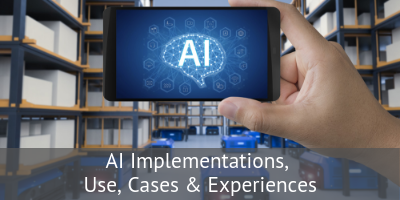By: Kyoko Kobayashi
This session started with presentations of real-life experiences implementing AI. The presenters talked about what they went through identifying, planning, implementing and maintaining their AI, automation and Machine Learning cases. What was very useful were their lessons learned and tips on best practices. The presentations were followed by a panel discussion where many of the lessons learned and pitfalls to avoid were shared.
Some of the highlights of the presentations were:
Peter Tierney, Questrade: Questrade is in the business of real time direct trade and is Canada’s fastest growing online brokerage. They built their trading system from the ground up. Their idea was to use Machine Learning for their Risk Review process. They first looked at data as they had access to a lot of high quality data. Some of the key lessons leaned were:
- Important to have reliable and high quality data.
- Need collaboration of business teams. Bring them in at the beginning.
- Need to train the team and/or have highly skilled members on the team. They were fortunate to have a PHD on the team.
- Investment in experimenting is high. Need multiple iterations to train the model.
- Humans can be unpredictable in making decisions.
- Need close collaboration between trainers and those performing the job.
- Pick the right process for AI – not an automation, not high risk, something there is no other way of solving.
- Have proper governance. Make it part of a software development life cycle and incorporate the appropriate audits.
- Establish trust with business teams. They need to see the results before you go live.
Gurbir Perhar, Compass Digital Labs: Compass is in the business of food and hospitality. Gurbir heads up the data group including data science. He introduced the topic of Data Science with the quote: “Ask not what the data can do for you, ask what you can do with the data.” He also talked about the concept of the Amplification Loop where the business asks for something, you over deliver on the ask and then redefine the new low hanging fruit. His words of caution were to communicate in business terms and measure goodness using business metrics and by business impact.
Some of his key lessons leaned were:
- Business decisions still require human expertise.
- A data driven approach is not enough to guarantee success.
- The Data and Business groups need to collaborate. The Data team needs to understand the business and the business teams need to understand data.
The panel discussion that followed continued on the theme of lessons learned and reinforced may of the lessons learned shared in the presentations. Key discussion points were:
- Governance post implementation is important: Business teams need to be involved in diagnostics and audits.
- Employee adoption is critical: AI implementations may be seen as a threat. Pick the right use case. Communicate the value of the implementation, include plans for what employees will be doing post go-live.
- Show the upside of the value added work as a result of the implementation. Should not be seen as a straight automation.
- Business and technology have to go hand in hand.
- Resources: need the right skills and experience. It takes a long time to train so having the right skills and experience will reduce cost and time to market.
About the writer:
 Kyoko is an IT Executive specializing in building strategies with business teams to renovate technology platforms while transforming business capabilities. Her most recent roles were Vice President and CIO with a Provincial Authority and 2 major Canadian retailers. Prior roles have been in senior IT leadership roles in a combination of Retail and Financial Services organizations. Focused on driving business and technology planning and execution to achieve strategic objectives, Kyoko has led and contributed to the successful delivery of broad, cross functional initiatives in these roles. Kyoko also currently lectures at the University of Toronto on topics of Strategic IT Leadership. She holds a Bachelor of Science with Specialization in Computer Science from the University of Toronto.
Kyoko is an IT Executive specializing in building strategies with business teams to renovate technology platforms while transforming business capabilities. Her most recent roles were Vice President and CIO with a Provincial Authority and 2 major Canadian retailers. Prior roles have been in senior IT leadership roles in a combination of Retail and Financial Services organizations. Focused on driving business and technology planning and execution to achieve strategic objectives, Kyoko has led and contributed to the successful delivery of broad, cross functional initiatives in these roles. Kyoko also currently lectures at the University of Toronto on topics of Strategic IT Leadership. She holds a Bachelor of Science with Specialization in Computer Science from the University of Toronto.
